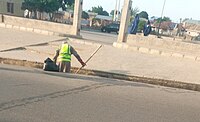Global environmental inequality

So, you know how we live in a big world with lots of different countries, and people who live in those countries can have different things, like different kinds of food, clothes, or toys? Well, the same thing goes for the environment, or the world around us.
Some countries have more natural resources, like clean water or fertile land, while others might have less or none at all. And the sad part is that this can create what we call "global environmental inequality", which means that some people, especially in poorer countries, might not have access to things that we all need to live a good and healthy life.
For example, some places might have more pollution in the air or water because of factories or cars that release harmful stuff, while other places might have less because they don't have as much industry or traffic. This can lead to things like more cases of asthma or other illnesses in some areas, while other places might have cleaner air and healthier people.
Another thing that can create global environmental inequality is climate change, which is when the planet is getting warmer because of things like burning fossil fuels (that's oil, coal, and gas that we use to make energy). This can cause things like more severe weather, like hurricanes and floods, that can hurt people and damage homes and crops. Some countries might be more vulnerable to these things because of where they are located or how developed they are, while others might have more resources to protect themselves.
So, what can we do about global environmental inequality? Well, one thing is to be aware of these issues and try to learn more about what's going on in different parts of the world. We can also try to reduce our own environmental impact, like by using less energy, recycling more, and supporting policies that protect the environment. And we can support organizations and movements that are working to address these inequalities and make the planet a better place for everyone.
Some countries have more natural resources, like clean water or fertile land, while others might have less or none at all. And the sad part is that this can create what we call "global environmental inequality", which means that some people, especially in poorer countries, might not have access to things that we all need to live a good and healthy life.
For example, some places might have more pollution in the air or water because of factories or cars that release harmful stuff, while other places might have less because they don't have as much industry or traffic. This can lead to things like more cases of asthma or other illnesses in some areas, while other places might have cleaner air and healthier people.
Another thing that can create global environmental inequality is climate change, which is when the planet is getting warmer because of things like burning fossil fuels (that's oil, coal, and gas that we use to make energy). This can cause things like more severe weather, like hurricanes and floods, that can hurt people and damage homes and crops. Some countries might be more vulnerable to these things because of where they are located or how developed they are, while others might have more resources to protect themselves.
So, what can we do about global environmental inequality? Well, one thing is to be aware of these issues and try to learn more about what's going on in different parts of the world. We can also try to reduce our own environmental impact, like by using less energy, recycling more, and supporting policies that protect the environment. And we can support organizations and movements that are working to address these inequalities and make the planet a better place for everyone.
Related topics others have asked about:
